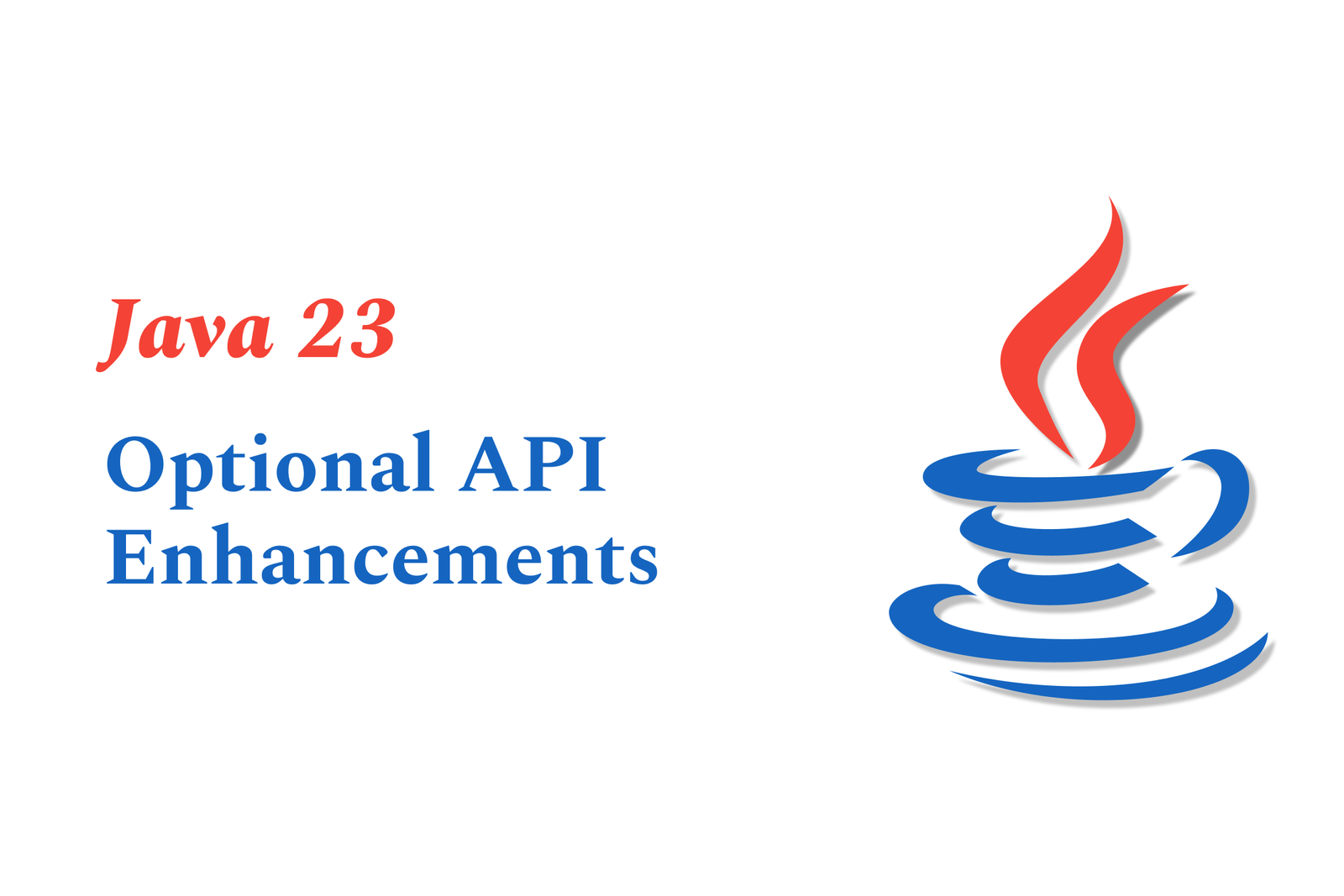Java 23 optional API enhancements
Java 23 enhances the Optional API by adding clearer, more expressive methods for handling nullability, improving stream integration, and supporting functional programming patterns. These updates simplify null checks, reduce boilerplate, and promote safer, more readable code.
Java 23 Optional API Enhancements
1 ) Introduction to Optional in Java SE
The Optional class is a container object that may or may not contain a non null value.
It simplifies the handling of null values by providing methods to check presence, retrieve values, and perform actions conditionally, avoiding null pointer exceptions.
Introduced in Java 8, it is meant primarily as a method return type to indicate the possible absence of a result.
2 ) Core Functionality of Optional
Key methods include:
`empty()`: returns an empty Optional instance.
`of(T value)`: returns an Optional containing the non null value.
`ofNullable(T value)`: returns an Optional describing a value if non null, else empty.
`isPresent()` / `isEmpty()`: tests presence or absence of a value.
`get()`: returns the contained value or throws if absent.
`ifPresent(Consumer)`: executes an action if value is present.
`ifPresentOrElse(Consumer, Runnable)`: executes an action if present, or a fallback action if empty.
`filter(Predicate)`: returns Optional if value matches the predicate.
`map(Function)` and `flatMap(Function)`: transform the value if present.
`orElse(T)`, `orElseGet(Supplier)`, and `orElseThrow()`: provide fallback values or exceptions.
`or(Supplier)`: returns an Optional from a supplier if empty.
`stream()`: returns a Stream of the value if present, otherwise empty.
3 ) Java 23 Enhancements & Highlights
Java 23 continues to enhance Optional’s API, focusing on clearer, more expressive methods to handle the presence or absence of values.
Introduction of the `isEmpty()` method (from earlier versions) allows easier checks for absence without negating `isPresent()`.
Expanded support for functional style programming with improved stream integration and conditional execution.
Enhanced methods facilitate safer and more readable null handling patterns, reducing boilerplate code.
Java 23 documentation emphasizes Optional as a value based class, advising against using it for synchronization or identity sensitive features.
4 ) Best Practices with Optional in Java 23
Avoid using null with Optional variables; always initialize with an Optional instance.
Use Optional as a method return type to cleanly represent optional values instead of returning null.
Utilize `ifPresentOrElse()` for clear branching logic based on presence.
Prefer `or()` and `orElseGet()` for deferred, efficient fallback computation.
Leverage `stream()` to seamlessly integrate Optional with Stream API pipelines.
5 ) Summary
Java 23 maintains and refines the Optional API's purpose to make null handling more robust, concise, and error free.
By providing expressive and versatile methods, it helps developers write cleaner and safer code when dealing with potentially absent values.
The enhancements align with Java’s overall goal of functional programming paradigms and improved developer productivity.
In essence, Java 23’s Optional API enhances the utility and clarity of handling optional values, reinforcing best practices and functional programming styles in Java development.
https://justacademy.in/news-detail/flutter-github-stars:-most-watched-repos
https://justacademy.in/news-detail/microservices-with-java:-tools-&-frameworks-in-demand
https://justacademy.in/news-detail/java-and-serverless-functions:-new-tools
https://justacademy.in/news-detail/react-native-expo-sdk-updates-announced
https://justacademy.in/news-detail/react-native-performance:-new-optimization-tips
Related Posts
In 2025, top Angular libraries offer modern, feature-rich components and tools for building dynamic web apps. From powerful data grids to low-code platforms like UI Bakery, these libraries enhance development speed, UI design, and scalability, making them essential for Angular developers.
Migrating from AngularJS to Angular 17 involves gradually upgrading your app by running both frameworks together using tools like ngUpgrade, rewriting components in TypeScript, and adopting Angular’s modern architecture to enhance performance, maintainability, and long-term support.
Angular state management tools help organize and handle app data efficiently, improving scalability and maintainability. Popular options include NgRx for robust, RxJS-based patterns, and newer Signal Store solutions that offer simpler, reactive approaches integrated tightly with Angular’s latest features.
RxJS in Angular empowers developers to manage asynchronous data streams with powerful operators like `forkJoin`, `combineLatest`, and `zip`. Mastering these key operators in 2025 is essential for building efficient, reactive applications that handle complex event sequences seamlessly.
Angular performance optimization in 2025 focuses on improving app speed and responsiveness by using techniques like OnPush change detection, lazy loading, efficient data caching, and AOT compilation. These practices reduce load times, enhance user experience, and ensure scalable, fast Angular applications.
In 2025, Angular remains preferred for large-scale, enterprise apps with its robust, all-in-one framework, while Vue attracts developers seeking simplicity and fast development for smaller projects. Both frameworks excel, with choice driven by project needs and team expertise.
Angular Signals are a new reactive primitive in Angular 16 that enable fine-grained, efficient change detection by automatically tracking dependencies and updating only affected parts of the UI. They simplify state management and boost app performance, revolutionizing Angular's reactivity model.
Angular interview questions to prepare in 2025 focus on core concepts like components, directives, data binding, routing, and dependency injection, along with TypeScript mastery and latest Angular features to ensure strong practical knowledge for building scalable, efficient web applications.
AngularJS reached its official end of support in January 2022, meaning no further updates or security patches. To ensure app security and performance, developers should consider migrating to modern Angular versions or seek third-party long-term support options if immediate migration isn’t possible.
The Angular Roadmap 2025 highlights upcoming features focused on improving developer experience and performance, including zoneless Angular, Signals integration, enhanced Forms, async data handling, improved HMR, and expanded Angular Material/CDK enhancements, driving modern, efficient web app development.










